|
|
|
Sort Order |
|
|
|
Items / Page
|
|
|
|
|
|
|
| Srl | Item |
| 1 |
ID:
121054
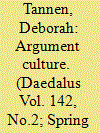

|
|
|
|
|
| Publication |
2013.
|
| Summary/Abstract |
Agonism - taking a warlike stance in contexts that are not literally war - pervades our public and private discourse, leading us to approach issues and each other in an adversarial spirit. The resulting "argument culture" makes it more difficult to solve problems and is corrosive to the human spirit. While examples from the intertwined domains of politics and the press may seem beyond individuals' power to change, the domain of private interactions - where equally destructive effects of the argument culture are felt - is one in which individuals have power to make quotidian yet revolutionary contributions to the common good.
|
|
|
|
|
|
|
|
|
|
|
|
|
|
|
|
| 2 |
ID:
121042
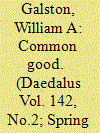

|
|
|
|
|
| Publication |
2013.
|
| Summary/Abstract |
Despite skepticism about the common good, the idea has both theoretical content and practical utility. It rests on important features of human life, such as inherently social goods, social linkages, and joint occupation of various commons. It reflects the outcome for bargaining for mutual advantage, subject to a fairness test. And it is particularized through a community's adherence to certain goods as objects of joint endeavor. In the context of the United States, these goods are set forth in the Preamble to the Constitution - in general language, subject to political contestation, for a people who have agreed to live together in a united political community. While the Preamble states the ends of the union, the body of the Constitution establishes the institutional means for achieving them. So these institutions are part of the common good as well. These are the enduring commonalities - the elements of a shared good - that ceaseless democratic conflict often obscures but that reemerge in times of crisis and civic ritual.
|
|
|
|
|
|
|
|
|
|
|
|
|
|
|
|
| 3 |
ID:
121043
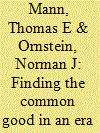

|
|
|
|
|
| Publication |
2013.
|
| Summary/Abstract |
The framers designed a constitutional system in which the government would play a vigorous role in securing the liberty and well-being of a large and diverse population. They built a political system around a number of key elements, including debate and deliberation, divided powers competing with one another, regular order in the legislative process, and avenues to limit and punish corruption. America in recent years has struggled to adhere to each of these principles, leading to a crisis of governability and legitimacy. The roots of this problem are twofold. The first is a serious mismatch between our political parties, which have become as polarized and vehemently adversarial as parliamentary parties, and a separation-of-powers governing system that makes it extremely difficult for majorities to act. The second is the asymmetric character of the polarization. The Republican Party has become a radical insurgency - ideologically extreme, scornful of facts and compromise, and dismissive of the legitimacy of its political opposition. Securing the common good in the face of these developments will require structural changes but also an informed and strategically focused citizenry.
|
|
|
|
|
|
|
|
|
|
|
|
|
|
|
|
| 4 |
ID:
155891


|
|
|
|
|
| Summary/Abstract |
The article probes the effects of Islamic doctrine on the allocation of hydrocarbon revenues and vice versa and the significance of this relationship for politics. It explores two areas of (state-directed) distributive activity—government subsidies and charitable giving—in Saudi Arabia, Kuwait, Qatar, and Oman. It demonstrates how both oil revenues and Islamic doctrine are mobilized to consolidate state authority and how both have been manipulated and deliberately interconnected as tools of state power.
|
|
|
|
|
|
|
|
|
|
|
|
|
|
|
|
| 5 |
ID:
190457


|
|
|
|
|
| Summary/Abstract |
Governance is essentially a dynamic mechanism to promote collective action for the common good. The Chinese concept of the public/common (gōnggòng) and its political philosophy of Grand Union governance provide an alternative perspective for understanding such dynamics from the unit of family through institutions to the state-embedded society. Three critical arguments with interconnected elements are analysed: governance as a dynamic mechanism; review of the historical, philosophical and political legacy of Chinese governance; and proposal of a framework for governance of the Grand Union. It concludes that ‘Chinese characteristics’, such as diverse adaptations, gradual flexibility, experimental pragmatism, and polycentric balance with a strong central state are all deeply rooted in its pre-revolutionary ancien régime. In order to understand these seemingly different institutions and values, we need to revisit their original functionality of governing for the common good.
|
|
|
|
|
|
|
|
|
|
|
|
|
|
|
|
| 6 |
ID:
147339
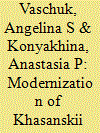

|
|
|
|
|
| Summary/Abstract |
In our article, we discuss development issues in a strategically important Russian territory—Khasanskii Raion (district). We focus on the implementation of infrastructure projects within the framework of establishing the International Transportation Corridor Primor'e-2, and on subjective assessments of modernization in terms of the common good. We conclude that an assessment of the rhetoric and practice of proposed projects reveals a close relationship with other experiences of post-Soviet transformation, showing that modernization itself is largely selective, nonsystemic, and controversial in its social consequences.
|
|
|
|
|
|
|
|
|
|
|
|
|
|
|
|
| 7 |
ID:
152562
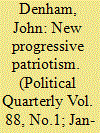

|
|
|
|
|
| Summary/Abstract |
The need to hold capital to account and to bend markets to the common good is as powerful as ever, yet it is becoming steadily harder to create an electoral or political majority for such an idea in societies that are fractured and divided. The fundamental bond between voters and parties depends on political identity relationships; old ones are fading, new ones need to be created. The most dynamic politics in advanced capitalist societies are those of nation, people and place. The strategic challenge for the left is to create a new progressive patriotism that can embed radical ideas in a common sense of national purpose.
|
|
|
|
|
|
|
|
|
|
|
|
|
|
|
|
| 8 |
ID:
097747
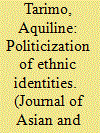

|
|
|
|
|
| Publication |
2010.
|
| Summary/Abstract |
Kenya is encountering many challenges. One of them includes the tendency of manipulating ethnic identities for private interest. We can grasp the root causes of the prevailing ethno-political violence insofar as we take seriously the following questions. How is ethnic identity related to the conflict of loyalties and interests? How have the dynamics of ethnic identities fashioned the existing understanding of the common good and political life? Have Christian churches managed to stand above ethnocentrism and the tension it generates? In search for long-term solutions to these questions this study shows how ill-founded methodologies tend to sideline equal citizenship among citizens in favor of the model of exclusion founded upon ethnocentrism. The challenge of integrating cultural identities in the processes of political integration and democratization is closely related to the problematic concepts of nation-state, citizenship, and common good.
|
|
|
|
|
|
|
|
|
|
|
|
|
|
|
|
| 9 |
ID:
191235


|
|
|
|
|
| Summary/Abstract |
A long-lasting, large-scale power blackout has a huge impact on the infrastructure of public life, as well as on critical infrastructure including electricity and water supply. At the same time, it can be observed that the share of renewable energies, and thus the possibility of self-sufficiency, has increased enormously in recent years. This contribution focuses on the question to what extend citizens are willing to share their electricity resources in order to make their city more resilient. In reference to Ostrom's concept of club or common goods, it can be shown if and how the private good of citizen's electricity resources can be transformed into a club or even a common good. Drawing on survey data from the city of Darmstadt we investigated the willingness to share electricity and to participate in participatory formats to enhance urban resilience.
|
|
|
|
|
|
|
|
|
|
|
|
|
|
|
|
| 10 |
ID:
121056


|
|
|
|
|
| Publication |
2013.
|
| Summary/Abstract |
For individuals living in a small community, the notion of "common good" seems almost natural; it can be thought of simply as neighborly morality. However, in a complex modern society, it is far more challenging for individuals to define and agree upon what is the common good. Nonetheless, two contemporary roles would benefit from embracing a broader sense of the good: 1) membership in a profession; and 2) membership in a polity. Drawing on findings from the GoodWork Project, I describe how the common good can become a guiding value in the professional and civic realms; discuss threats to such guiding values; and suggest some ways to promote the common good in contemporary American society.
|
|
|
|
|
|
|
|
|
|
|
|
|
|
|
|
| 11 |
ID:
085895


|
|
|
|
|
| Publication |
2009.
|
| Summary/Abstract |
Schumpeter's redefinition of representative democracy as merely leadership competition was canonical in postwar political science. Schumpeter denies that individual will, common will, or common good are essential to democracy, but he, and anyone, I contend, is forced to assume these conditions in the course of denying them. Democracy is only a method, of no intrinsic value, its sole function to select leaders, according to Schumpeter. Leaders impose their views, and are not controlled by voters, and this is as it should be, he says. I respond that his leadership democracy is implausible, both descriptively and prescriptively. Competitive election is a necessary, but not a sufficient condition of democracy, not sufficient even for the limited empirical purpose of regime classification. Any adequate definition of democracy must make reference to the common will, the common good, and other values, I submit.
|
|
|
|
|
|
|
|
|
|
|
|
|
|
|
|
| 12 |
ID:
121045
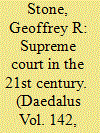

|
|
|
|
|
| Publication |
2013.
|
| Summary/Abstract |
How does the Supreme Court serve the "common good"? What is the Court's responsibility, as the ultimate interpreter of the Constitution, in our constitutional system of government? This essay explores that question with an eye on the recent performance of the Court in highly controversial and divisive cases. What explains the Court's decisions in cases involving such issues as campaign finance regulation, gun control, abortion, affirmative action, health care reform, voting rights, and even the 2000 presidential election? This essay argues that there is a right and a wrong way for the Supreme Court to interpret and apply the Constitution; and whereas the Warren Court properly understood its responsibilities, the Court in more recent decades has adopted a less legitimate and more troubling mode of constitutional interpretation.
|
|
|
|
|
|
|
|
|
|
|
|
|
|
|
|
| 13 |
ID:
102750


|
|
|
| 14 |
ID:
121055


|
|
|
|
|
| Publication |
2013.
|
| Summary/Abstract |
Pursuing the common good in a pluralist democracy is not possible without making compromises. Yet the spirit of compromise is in short supply in contemporary American politics. The permanent campaign has made compromise more difficult to achieve, as the uncompromising mindset suitable for campaigning has come to dominate the task of governing. To begin to make compromise more feasible and the common good more attainable, we need to appreciate the distinctive value of compromise and recognize the misconceptions that stand in its way. A common mistake is to assume that compromise requires finding the common ground on which all can agree. That undermines more realistic efforts to seek classic compromises, in which each party gains by sacrificing something valuable to the other, and together they serve the common good by improving upon the status quo. Institutional reforms are desirable, but they, too, cannot get off the ground without the support of leaders and citizens who learn how and when to adopt a compromising mindset.
|
|
|
|
|
|
|
|
|
|
|
|
|
|
|
|
| 15 |
ID:
121048
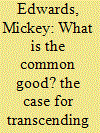

|
|
|
|
|
| Publication |
2013.
|
| Summary/Abstract |
Even if most of us can agree on a definition of the "common good" (not a simple matter), there are substantial barriers to establishing public policies in accord with that agreement. The "democratic" element in our political system - the right of voters to choose the men and women who will create our laws - depends on the views of those voters being given considerable weight in determining eventual policy outcomes. Unfortunately, we have developed a political system - both in our elections and in the governing process - that gives disproportionate influence to relatively small numbers of voters (who are also the most partisan) and allows political parties through their closed procedures to limit the choices available to general election voters. Coupled with legislative rules that allow partisans to determine the makeup of legislative committees, the resulting process leaves the common good, however defined, a secondary consideration at best.
|
|
|
|
|
|
|
|
|
|
|
|
|
|
|
|
|
|
|
|
|